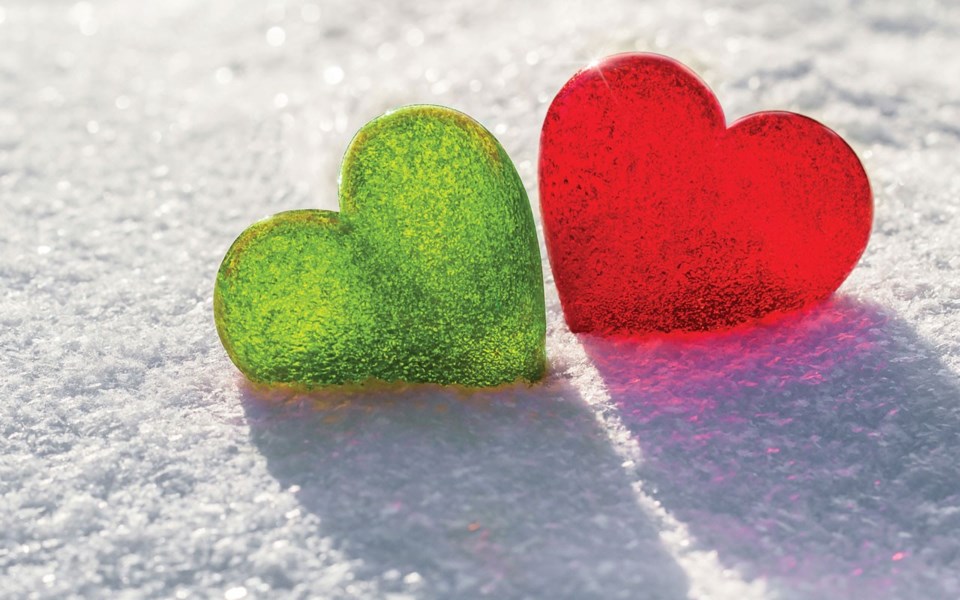Happy Valentine's Day, everyone! Such a sweet time for love—so this year let's get the good vibes going for this amazing place we call home and dish out our finest "green love" along with the usual pink and red.
But before we get started with all the happy hearts, let me ask, what's "home" for you?
Remember that sweet and crazy thing most of us do when we're kids and figure out that "home" is a telescoping target? It goes something like this: "I live at 1234 Alpine Way, Whistler, BC, Canada, Earth, Solar System, Universe, Cosmos." On we'd go, and laugh, as if some vein of divine cosmic awareness had suddenly come home to roost, pardon the expression, and, really, it had.
Still, it never escapes me how many of us draw the line for home at the end of our driveway, or the threshold of our front door. Or our community's boundary. Or, God forbid, our national border.
And it didn't escape many that NASA's latest report on the state of the climate—a powerhouse of a report irrefutably laying out the evidence how we humans are dangerously heating our beautiful home, beyond anything imaginable back when we were kids—came out the day after President Donald Trump's State of the Union address. An address in which he failed to mention climate change. No-sirr-ee. That didn't escape too many of us.
Read all about it in NASA's own words (climate.nasa.gov) or the Feb. 6 New York Times' graphically charged article. We're now at more than 1 C above the historic average of the late 1800s. "Even an increase of 1.5 degrees will have dire consequences, according to the United Nations science panel on climate change," says the article.
Last year was the fourth warmest year in 140 years of modern record-keeping, only behind 2015, 2016 and 2017. Eighteen of the 19 warmest years have occurred since 2001—the year Feet Banks caught everyone's eye with his cult film, Parental Advisory. The year after Stella Harvey founded the Vicious Circle, and, in turn, Whistler Writers Festival; and Arthur De Jong's grabbing of Whistler Blackcomb's (WB) management lapels to drive the mountains to a zero operating footprint was manifest in a formal plan named, what else? Zero Operating Footprint.
So how are we doing, folks, on our own personal arcs of spreading the green love and skinnying down the ol' carbon footprint?
In the big picture, since 2012-13, Whistler's greenhouse-gas emissions have actually gone up because of so many more visitors. In fact, they're going up so much, the resort won't be able to meet its 2020-30 emission reduction goals. But on the sunny side, there's a double-digit reduction on a per capita basis, so locals are doing more.
"Are we doing enough? Absolutely not—we need to step it up," says Arthur speaking unofficially as just another Whistler local who cares, without either his rookie RMOW councillor hat or that as senior manager of mountain planning and environmental resources for WB.
Still, it's heartening to see how many people who love their Whistler home are doing remarkably cool things.
Feet bought a hybrid last year that gets better mileage than my Smart car. He composts. Walks to work. Holds in his farts. Buys local and avoids internet shopping and stuff from China like the plague. And he and the rest of the gang at Mountain Life planted 6,100 trees last year to offset paper the publication used over the past 12 years.
The inimitable Sara Jennings—good pal of Feet and single mom of two who are getting a big lesson in green love every day—has hardly ever owned a car, period. She doesn't have one now. She and her kids live in a wonderfully small home of 550 square feet. They don't have a TV. They cook from scratch, go vegetarian at home, and avoid plastic and one-use containers.
The equally inimitable Cate Webster focuses on energy use. Their utility bill is "outstandingly low" since she and Y.P. use indoor drying racks. They heat hot water on the fireplace for dishes, shower (no baths), and wear sweaters and cozy slippers, just like our moms and dads taught us to do.
As for Arthur, he and his wife Nicola have resolved to eat more plant-based foods. (Arthur and Dan Wilson at Whistler's Centre for Sustainability hold up Paul Hawken's bestseller Drawdown—"the most comprehensive plan ever to reverse global warming"—as a great resource. Interestingly, two of the top four reversals deal with food: reduced food waste and a plant-rich diet). They're down to one meat dish every two days; Nicola is chopping beets as we speak. They compost like crazy, waste little food, plus Arthur has figured out how to chop 30 per cent off his on-mountain vehicular emissions by simply travelling with colleagues or using the lifts more.
As for that excellent zero footprint plan Arthur started at WB, it has wagged the dog and has now spread to all Vail mountain resorts. But not before driving wonderful initiatives on the local mountains, like reducing WB's waste since 2000 by more than 70 per cent, and seeing 80 per cent organic/local offerings at both Steeps and Christine's eateries.
So what else can we do in the green love department? Lots, my friends. If you need more inspiration, read about Leslie Anthony's and Asta Kovanen's no-shopping experiment in "Year of Living Better" in last week's Pique. And remember, home really is where the heart is.
On that note, let's take another line from Arthur: "Each and every one of us, we all have the power."
So let's get 'er done.
Glenda Bartosh is an award-winning journalist who wants a VV—Vegan Valentine, to be clear—on Feb. 14.




